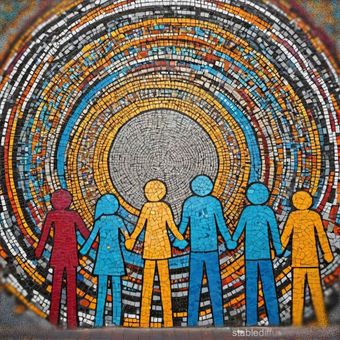

Support Circles, LLC
Moving On in Supportive And Inclusive Community
What's New At a Glance
***
**MOSAIC's 3rd Religious Trauma Support Group**
Sunday mornings in Mt Juliet starting January 11th
***
**MOSAIC’s 2nd Podcast Discussion Group**
Virtual at 12:00 on Mondays starting January 26th
***
Upcoming Winter 2026 Groups!
***Registration Closed for 2025 Groups but please read below for 2026 offerings ***
Upcoming Groups at a Glance!
RELIGIOUS TRAUMA SUPPORT GROUP
(in person: Mt. Juliet. 10:00-11:00 weekly Sunday mornings for 5 weeks) Minimum 4, Maximum 10 participants.
MOSAIC Podcast Discussion Groups
Like a "self-help" book club but in a format that's accessible to a wider range of leaners, via a broader scope of media, such as talks, podcasts, & videos sent weekly for you to listen to / read / watch and then come and discuss!
(Virtual: 12:00-1:00 starting 1/26)
LIVING LOSS GRIEF:
Grieving things like a level of health you'll never get back to, a belief system you built your life around that no longer works for you, a sense of safety in your community, a physically or mentally declining parent, a childhood you should have had but didn't (CPTSD), a political system or religious system you see harming those around you, the loss in trust of yourself after a relationship loss, estrangement, a child in addiction... these are all things our culture fails to recognize as deep griefs but that need recognition and support to process in community (virtually every 3rd Wednesday evening starting 1/21)
MOSAIC's Mission
The Mission of MOSAIC (Moving On in Supportive and Inclusive Community) is to make affirming mental health more accessible by providing opportunities for connection through a variety of therapeutic groups utilizing art, music, embodied practices, and mental health education.
healing can't happen if you don't feel safe
We are partnering with other mental health professionals and educators in the community who are equally committed to safe spaces. From groups to private counseling, please check them out if you need additional services.
Partners
* Matt Clarady is a blacksmith who donates his time not only to gun surrender events to help make the streets of Nashville safer, but also forges unwanted guns into garden tools, art, and jewelry. Check out Raw Tools and Raw Tools South on Instagram, and support them by visiting the Raw Tools Shop here.
*Carrie Friddell, MT-BC, NMT is an affirming music therapist and founder of In Harmony Music
*Jennifer Bartley, LMFT at Daybreak Therapy is an affirming therapist who specializes in religious trauma.
*Pamela Hicks, LMFT is an affirming therapist in Nashville with certifications in a large variety of therapeutic approaches.
*Sarah Detring is an affirming therapist in Nashville
Directory
Thank you to Brooke Lamb at Abide Counseling for this list of other safe practices in our community:
FAQ's
MOSAIC
MOSAIC is a collaborative of educators and mental health professionals coming together to apply a broader, more expansive approach to the group therapeutic model.
It is important to us that we be an affirming and safe community for people of all genders, races, ages, abilities, ethnicities, sexual orientations, cultures, and religions.
EDUCATIONAL & MENTAL HEALTH
MOSAIC is a beautiful weaving together of both education and mental health services in a group setting to increase emotional literacy and help people find support through connection with others in similar life circumstances. built on our firm belief that there is more than one way to teach and more than one way to provide both benefit from utilizing a more holistic approach We do this by utilizing a holistic approach to both mental health and education
CREATIVITY
We are all about creativity in forming our Circles. We borrow and blend tools from the Arts in education and from Experiential Therapy, which is defined by Psychology Today as the use of "expressive tools and activities—such as role-playing or acting, props, arts and crafts, music, animal care, guided imagery, or various forms of recreation" to help clients better identify emotions. .
Guided Mental Wellness Book Discussions. Click below to learn more about just a few of the books we have on our schedule.
Art Circles
Art Therapy, Open Art Circles, and Guided Art Exercises. Please click below to learn more about making art and creativity part of your mental health care.
Embodied Practice: MOSAIC in Motion Circles
Somatic work is so important in our healing journeys, so our embodied approaches will range from meditation to play to Tai Chi to dance!
"Grief is any loss of an imagined future"
Living Loss Support Group
Most of us have dealt with the grief that comes with Non-death losses, but many of us haven't recognized it as Grief. These could be a friendship, a pregnancy, a career, your health or the health of a child, or your church, or your entire faith. It could be a physical or emotional estrangement from a friend or parent, or an unexpected demanding caregiver role that isolates you from support, etc. The grief we experience from these losses is made complicated by society's lack of awareness that this is in itself a grief, AND it often has a domino effect causing many other losses. For example, a job loss can cause you to lose your work community, your friendships, your identity, your financial security, your home, your feeling of self-worth, etc. In these groups we will discuss patterns we may be using to deal with loss. We will share our stories, identify secondary losses, and work towards growth and healing in a community as we validate and share each other's grief.
Religious Harm & Trauma Support Group
Most people don't know that those who experience religious harm and religious trauma can have similar symptoms as those with Complex Trauma (CPTSD) because they impact the nervous system and developmental and neurological wiring in similar ways. In our Fall Religious Trauma support group, you will have the opportunity to share and hold space for others in the religious harm community, gain insights from mental health professionals about how embodied fundamentalism makes healing from religious trauma particularly difficult, and learn coping skills that are based on the belief that deconstruction is not the same thing as healing. Join us for this unique approach to dealing with the grief that accompanies being hurt by the places you went for healing.

